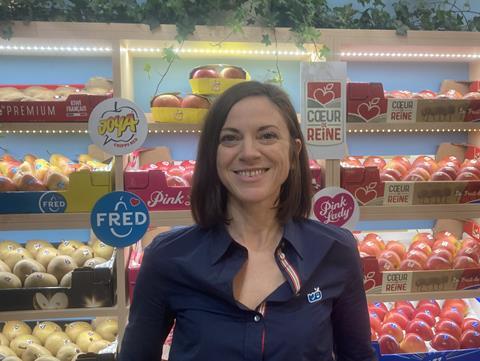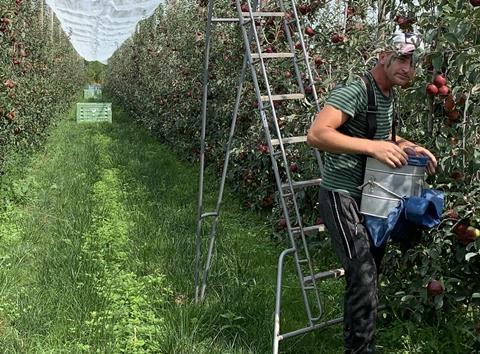(Re)Generation Fruit, a Blue Whale-led consortium in France, is seeking to support the ecological transition of the sector while providing vital economic resilience for its growers
A consortium led by Blue Whale has launched a major project aimed at making the French apple industry more sustainable. (Re)Generation Fruit is a five-year initiative to test and combine innovative technologies to ensure the agro-ecological transition of the apple sector, supported by the French government and co-funded to the tune of €8m on a global budget of €12m.
The other members of the consortium are Maf Roda, biotech start-ups Micropep and AsciepiosTech, the engineering school of Purpan and the National Institute for Agricultural, Food and Environmental Research (INRAE).
“Our aim is to promote the ecological transition of the sector by working to maintain production levels and reduce the use of pesticides,” said Blue Whale CEO Bruno Bertheloz. “We are convinced that technological innovation will allow us to evolve towards ecologically efficient and economically sustainable production.”
Between now and 2028, the consortium is set to work on validating methods and innovations to achieve a number of goals: improving soil life, boosting plants’ natural defences against pests, cutting the use of phytosanitary products by half, minimising fruit losses, improving the nutritional content of the fruit and producing in ways that respect the ecosystem.

The work will be carried out in experimental centres in the south-west of France and in the Loire Valley, with the partners meeting regularly to share progress. In five years, the conclusions will be communicated to the public.
(Re)Generation was launched in Montauban, France last September and unveiled internationally at Fruit Logistica in Berlin by Blue Whale’s marketing and communications manager, Christelle Bertin.
“It is very important for us to involve all links in the chain in this project,” Bertin said. “Our customers are already implementing targeted CSR plans. Through (Re)Generation Fruit, we as their producers and business partners can help them achieve their goals. That’s why continuous communication and collaboration with all stakeholders is crucial for us.”
There are two big topics in the apple category, she told Eurofruit. “The first one is, how can we revitalise consumption?” she said “And the second is, how can we create economic resilience for growers while achieving our sustainability goals?
“On the first topic – driving together the economic resilience of growers and sustainability – we think that acting concretely is the key,” Bertin highlighted. “The impact of climate change on Europe’s apple orchards, including the increasing threat of late frost, variations in rainfall, flash floods, strong winds and intense drought, should not impact the high quality of the products we provide to our clients.
“The goal with an ambitious R&D project such as (Re)Generation Fruit, she said, is to continue providing top-quality experience to consumers while using less phytosanitary products, tackling the consequences of climate change, causing less waste and providing economic resilience for growers.”

The way to do that is manifold, she added, including such R&D projects, as well as water management, the creation of the right agronomical conditions for cooling and water capture, moving to 100 per cent hail net protection and collaborating on hot climate varieties.
Importance of new generation
Another hurdle for the category in recent decades has been the difficulty in attracting younger generations to join the business. “When it comes to change management, 70 per cent of success comes from the new generation – so new people and fresh eyes,” said Bertin. “That means you need a strategy to get new people involved, new talent. This is what we are doing when it comes to growers with the (Re)Generation programme, looking at how to ensure growers remain profitable and also have an innovative mindset when it comes to agronomy.”
On the subject of boosting lagging consumption, Bertin identifies the opportunities presented by the Candine apple. “If we want the new generation to go back to apples, then we have to target them with the right product in the right way, with the right communication,” she explained. “Candine, thanks to its organoleptic qualities, already shows great potential to bring younger people back to the category. It may be a good product and a good brand to do something quite different in terms of marketing. So we have the opportunity to test and learn new things about content – being bolder in the way we present it.”
According to Bertin, the main reason apple consumers give for no longer buying the fruit is disappointment. “Maybe they have been disappointed in the past – once, twice – because of the texture or the freshness,” she said. “So it’s not just about the taste profile. It’s also about overall quality and shelf-life management, and it’s important to focus on a high-level consumption experience.”



